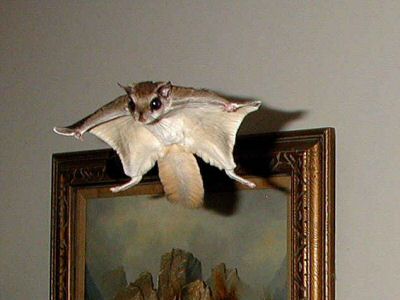
Flying Squirrels
Scientific Name: (Pteromyini or Petauristini)
Lifespan: In the wild, flying squirrels can live between 6-12 years. If kept domestically, their lifespan increases to up to 20 years.
Description
There are approximately 50 species of flying squirrel found throught the world. Flying squirrels have a thin membrane that runs from their front legs to their rear legs. This membrane acts like a parachute and allows the flying squirrel to glide from taller objects, like trees, to lower areas giving the impression of actual flight. Flying squirrels have been recorded gliding up to 300 ft.
Reproduction
February and March are the prime months for mating. Young flying squirrels stay with their mother for approximately a month and a half after birth. During that time they practice their gliding skills and after are able to leave the nest. They become able to independently survive at that time and will search for a mate a few months later.
In the wild, flying squirrels build their nests about 15 – 20 feet off the ground. This height is also the height of many attic vents in homes which is why attics are a preferred nesting site. Attics offer a controlled climate and are secure from a squirrels usual predators.
The average litter consists of between 1 and 4 young and the female can potentially have 2 litters each year. Baby flying squirrels are born with no fur and are completely helpless.
How Flying Squirrels Can Destroy Your Home
Colonies of flying squirrels can contain up to 20 individuals. All of them are trying to find food and things to chew on. Flying squirrel teeth never stop growing so they have to constantly chew to keep their teeth from overgrowing. If the teeth become overgrown, the animal is unable to close it’s mouth making it unable to chew which leads to death by starvation.
Flying squirrels can cause serious damage to your home. They will find small gaps to get into your home or they will chew a hole to get in. Once they get a foothold in your attic, they will chew furniture, cardboard boxes, floors, moulding, doors, windows and even electrical wiring. It goes without saying that any electrical wires that are chewed through can, and probably will, shortcircuit through the animals body and cause a fire. Flying squirrels have been known to chew through attic flooring right into the ceiling of the floor below.
Flying squirrels will also use the space they invaded as a latrine. The smell can be overpowering and will permeate the entire house if not stopped immediately. Flying squirrels may be “cute” and interesting creatures but do not let that dissuade you from getting rid of them as quickly as possible. There are 2 generally accepted methods of removal: trapping and releasing them or killing them.
Jarrod’s Pest Control generally does not use lethal force against flying squirrels unless a serious threat like rabies is discovered. We prefer to trap them and relocate them back to the wild.
Steps To Take If You Have Flying Squirrels
In order to dissuade flying squirrels from staying with you there are certain common sense steps you can take. The most important step is to eliminate their food sources. Often, pet food and human garbage can provide enough food to sustain quite a few individuals. Keep trash containers in a secure area or make sure that the lids are on securely and locked, if possible. If trash containers must be kept outside, a few drops of bleach in the can will make any waste food inside extremely unpalatable. The bleach odor keeps raccoons and feral dogs and cats, too. Temporarily remove any bird feeders in your yard until the problem has been rectified.
There are a number of repellents on the market that claim to be effective in driving out flying squirrels. These products claim that they drive away any animals that get close to repellent sprayed areas. These are usually a waste of money as they generally don’t work as advertised. Once a spray repellent is applied outdoors, it has to be reapplied every time it rains. The costs can add up pretty quickly as well as time spent re-spraying after it rains.
Mothballs have been used as a repellent for a long time, however, they don’t really work on flying squirrels. We have removed flying squirrels from attics where the homeowner had used mothballs and found that the flying squirrels were living next to piles of mothballs and did not seem to be bothered by them at all. Again, the only real way to repel flying squirrels is to trap them and relocate them.
Another common method of helping to get rid of flying squirrels is to cut away branches from around the house. This makes it more difficult for them to enter as it will somewhat restrict their flights. In areas with very mature trees, this may be somewhat of an impossibility.
Getting Rid Of Flying Squirrels
Getting rid of flying squirrels can be tricky. Squirrels are rodents and like all other rodents, they are able to flatten themselves out to fit through holes, cracks and gaps that seem impossibly small. This makes it imperative that all entrances to the attic are sealed up. It won’t do you any good to spend time and money (on traps) just to have them crawl back into the same holes they used to enter the first time.
Professional pest control companies are trained to know what steps to take in squirrel removal and can do it faster and better than the average homeowner. They will typically catch and remove the flying squirrels in a day or two and then come back to repair and seal cracks and gaps.
(706) 221-8000
Request Free Pest Inspection
EMERGENCY SERVICE AVAIALBLE
Request Free Pest Inspection
EMERGENCY SERVICE AVAIALBLE

